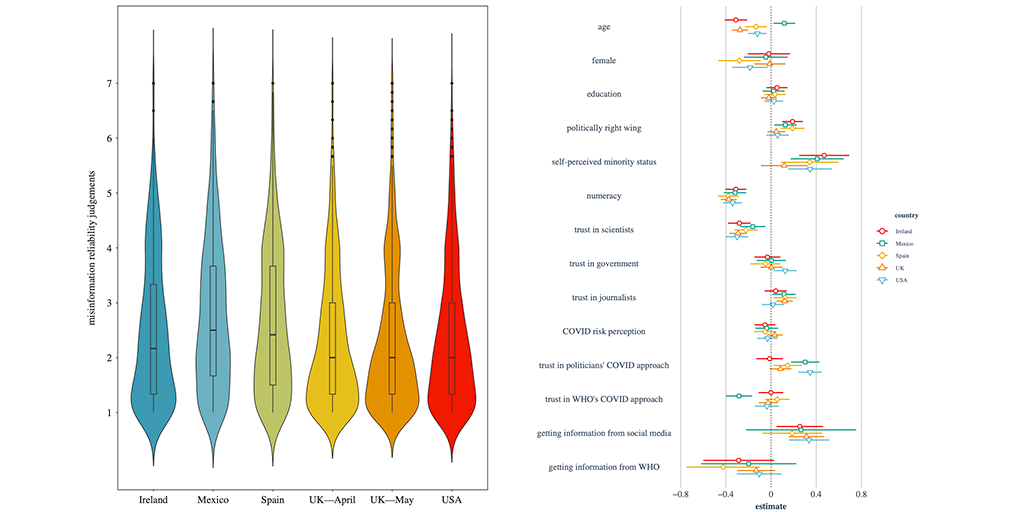Misinformation about COVID-19 is a major threat to public health. Using five national samples from the UK (n = 1050 and n = 1150), Ireland (n = 700), the USA (n = 700), Spain (n = 700) and Mexico (n = 700), we examine predictors of belief in the most common statements about the virus that contain misinformation. We also investigate the prevalence of belief in COVID-19 misinformation across different countries and the role of belief in such misinformation in predicting relevant health behaviours. We find that while public belief in misinformation about COVID-19 is not particularly common, a substantial proportion views this type of misinformation as highly reliable in each country surveyed. In addition, a small group of participants find common factual information about the virus highly unreliable. We also find that increased susceptibility to misinformation negatively affects people’s self-reported compliance with public health guidance about COVID-19, as well as people’s willingness to get vaccinated against the virus and to recommend the vaccine to vulnerable friends and family. Across all countries surveyed, we find that higher trust in scientists and having higher numeracy skills were associated with lower susceptibility to coronavirus-related misinformation. Taken together, these results demonstrate a clear link between susceptibility to
misinformation and both vaccine hesitancy and a reduced likelihood to comply with health guidance measures, and suggest that interventions which aim to improve critical thinking and trust in science may be a promising avenue for future research.
Introduction
The first human infection with the SARS CoV-2 novel coronavirus (COVID-19) was reported in December 2019 in Wuhan, China. Within three months, the virus spread across the globe igniting a global public health emergency. As of September 2020, there have been over 25 million cases worldwide and more than 800 000 people have died from the virus [1]. Scholars increasingly recognize that in order to contain the spread of the virus, insights from the social and behavioural sciences play an important role, especially when it comes to the spread of misinformation about the virus [2]. Indeed, misinformation about the COVID-19 pandemic is a serious threat to both public health and international relations, ranging from the proliferation of damaging health advice, such as ingesting bleach, to politically motivated conspiracies about where the virus originated from. In fact, the proliferation of false and misleading information about the virus, how it spreads, how to cure it and who is ‘behind’ it, has prompted the World Health Organization to warn of an ongoing ‘infodemic’ [3,4]. For example, false conspiracy theories about 5G masts causing or exacerbating COVID-19 symptoms have led to people setting mobile phone masts ablaze, endangering lives and property [5,6].
Prior research on the spread of misinformation in general has mostly been confined to the context of the 2016 US presidential election, finding that exposure to fake news was fairly limited in the population [7–10]. Similarly, large-scale analyses of Facebook data in the context of vaccine hesitancy also find that anti-vaccination groups are currently in the minority. However, the projected growth in anti-vaccination views is expected to dominate online discourse within a decade without intervention [11]. In the context of COVID-19, a recent analysis of the most viewed coronavirus YouTube videos found that over 25% of the top videos contained misleading information and totalled 62 million views worldwide [12]. There is also evidence to suggest that exposure to misinformation about the virus may be more common than often assumed. For example, a poll by Ofcom in the UK found that almost half (46%) of the British population report exposure to fake news about the coronavirus [13]. In particular, among those exposed, nearly twothirds (66%) report seeing it on a daily basis, which is problematic as repeated exposure is known to increase belief in fake news [14].
The proliferation of misinformation online, along with its real-life adverse effects on society and public health [15], has prompted researchers to investigate what may explain people’s belief in false information and conspiracy theories. In terms of demographics, being older has generally been associated with higher susceptibility to misinformation [7,9,10]. Some researchers have reported an association between self-reported minority status and belief in conspiracy theories [16,17]. Van Prooijen et al. [17], for example, argue that ‘feelings of deprivation lead marginalized minority members to perceive the social and political system as rigged, stimulating belief in both identity relevant and irrelevant conspiracy theories’. In addition, researchers have noted several important motivational drivers as predictors of belief in misinformation: lower trust in science and scientists [18–21], lower trust in journalists and the mainstream media [22], lower trust in government [23–25], as well as the role of political ideology, specifically conservatism [7,26–30].
In addition to these motivational factors, a growing literature has explored the role of ‘cognition’ in susceptibility to misinformation. Overall, a large literature finds that factors such as education [31,32], analytical thinking, numeracy skills, ‘bullshit receptivity’ and ‘intuitive’ versus ‘reflective’ thinking styles (often assessed via the cognitive reflection test) appear to play a consistent and key role in processing misinformation [10,14,33–39]. Following prior research [17], we included numeracy in the current study. Numeracy skills are defined as the broad ability to process basic numerical concepts and are often related to improved accuracy in judgement and decision making across a wide range of domains [38].
